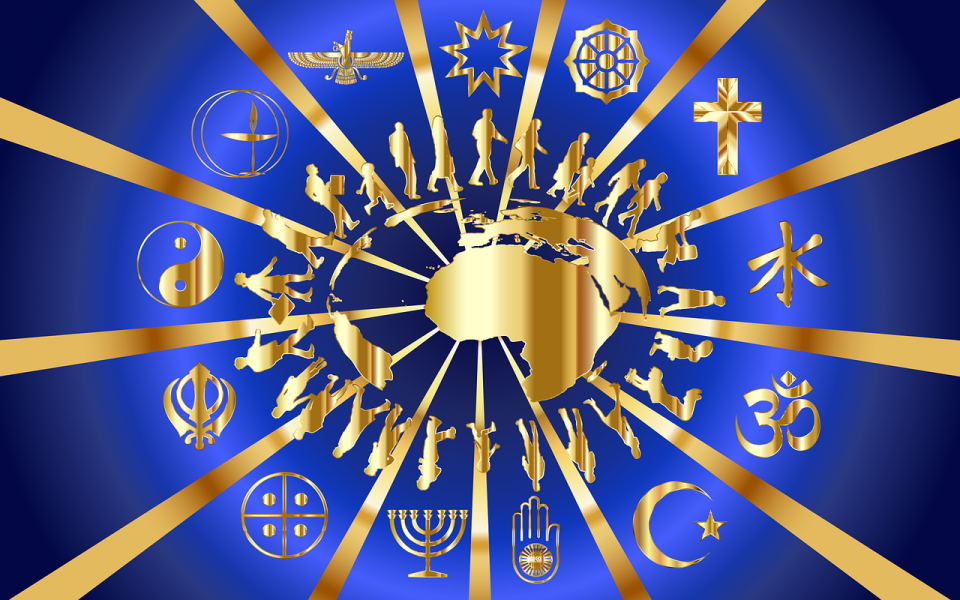Hi folks, I hope you are well, we will continue to monitor the guidance as to what we do on a Sunday evening. We think it’s probably still too cold to meet in gardens, so we will be meeting on zoom again. If you don’t normally get the link for Sunday nights but want to join is, then please do let me know.
This week our blog is written by John Morley.
People of faith
A few months ago I was going to write a blog on the sacred texts but struggled to find an angle from which to come at this tricky topic.
My own understanding has moved significantly in recent years from ‘we have the truth they don’t’ to ‘we have truth and I suspect they do too’.
Since agreeing to write a blog I’ve been reading a new Brian McLaren book called Faith after doubt. This gave me the idea to write about Christian’s relationships with those of other faiths rather than using sacred texts as my starting point.
I persevered through the first half of McLaren’s new book thinking ‘well you wrote all that 10 years ago’. It says that a growing faith moves through stages, from certainty to complexity to perplexity and finally to harmony, with doubt being the thing that helps us keep growing.
Anyway, in case Brian reads our blogs, the last chapters of the book really made me sit-up. It was also well worth the recap. I’d highly recommend the book.
And now it’s me who’s taken ages to get to the point. Getting back to relationships between the different faiths. I confess to using someone else’s ideas rather than my own for this discussion on interfaith. I admit to not being very well read or sorted in my thinking but I am exploring. Below are some quotes from the Brian McLaren book that hopefully provides us with some thoughts to reflect on:
‘Are you a believer whose beliefs put you in competition and conflict with people of differing beliefs, or are you a person of faith whose faith moves you towards the others with love? That phrase I just used, person of faith, in one sense makes a simple generalisation. It serves as a description that makes room for Christians, Muslims, Jews and so on. But I am coming to see that person of faith is not just a generalisation. It is also a differentiation, in contrast to a person of beliefs. It reflects a shared desire among people in all these diverse traditions to be identified not by lists of beliefs that exclude one another but by ‘something deeper, by faith in a universal, non-discriminatory love that calls us all together.’
‘This emphasis on love isn’t unique to the Christian Scriptures, of course. When the Torah repeatedly calls for compassionate treatment of aliens, refugees, widows, orphans, the poor, and the vulnerable, it calls Jews to make love central. The prophet Hosea echoes this emphasis when he proclaims the word of the Lord (6:6): ‘I desire compassion, not sacrifice’. The other prophets make similar statements in passage after passage (see Isaiah 1 and 58, or Micah 6, for example). When the Quran says that no one is a believer until they desire for their brother or sister what they desire for themselves, and that God made us different so that we would seek to understand and know one another, it is calling on humanity to put love first. When the gurus of Sikhism say to value others as you value yourself, and to avoid creating enmity with anyone because God is within everyone, when Taoists say to regard your neighbour’s gain or loss as your own, when Buddhists and Hindus say do not hurt others in ways you would find hurtful, and when secular humanists advocate the principle of reciprocity, they are calling on humanity to put love first’
(Faith after doubt pp126-127)
A final thought, I asked myself how Jesus tackled other religions? I thought of the good Samaritan. Maybe if Jesus were to tell this parable in our context instead of Samaritan he might say Muslim. I think he probably would.
So now some questions:
Are you a list maker or do you go with the flow?
Is faith more about love than beliefs, what are your thoughts?
Do beliefs put us in competition and conflict with other faiths? If so how?
What personal experiences have helped you and your understanding and relationships with other people of faith?
What do you think of this quote: ’Faith in a universal, non-discriminatory love that calls us all together’.
Should we, can we and if so how do we engage with those of other faiths more?

Rob Wylie is the founder of BeachcomberFX and guides its leadership team. He has worked in the North East for over 20 years and has vast experience from various roles he has held. He has a passion for Fresh Expressions of Church and Pioneer Ministry as well as beer, beaches and Miniature Schnauzers.
